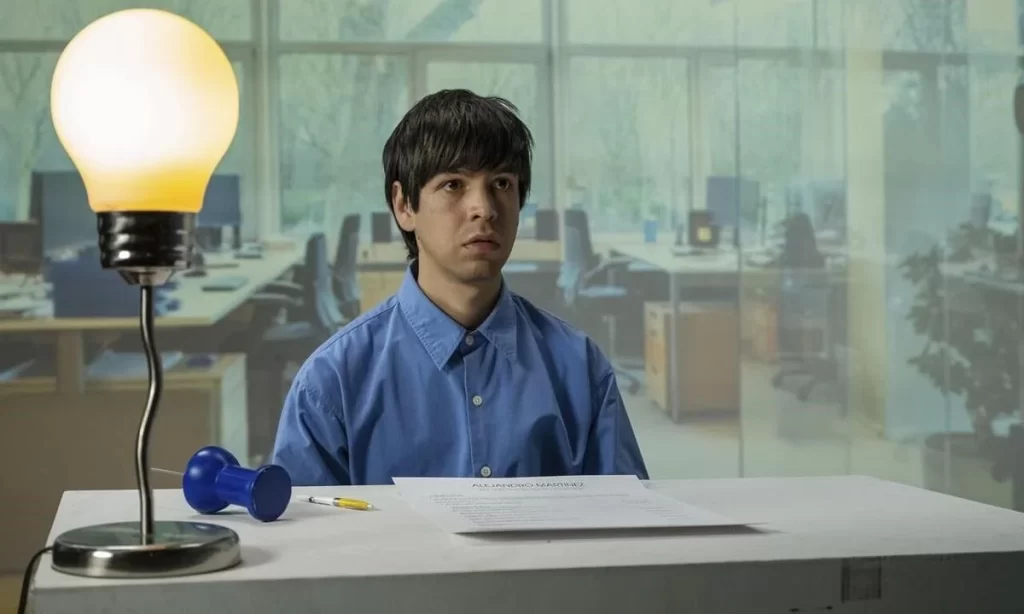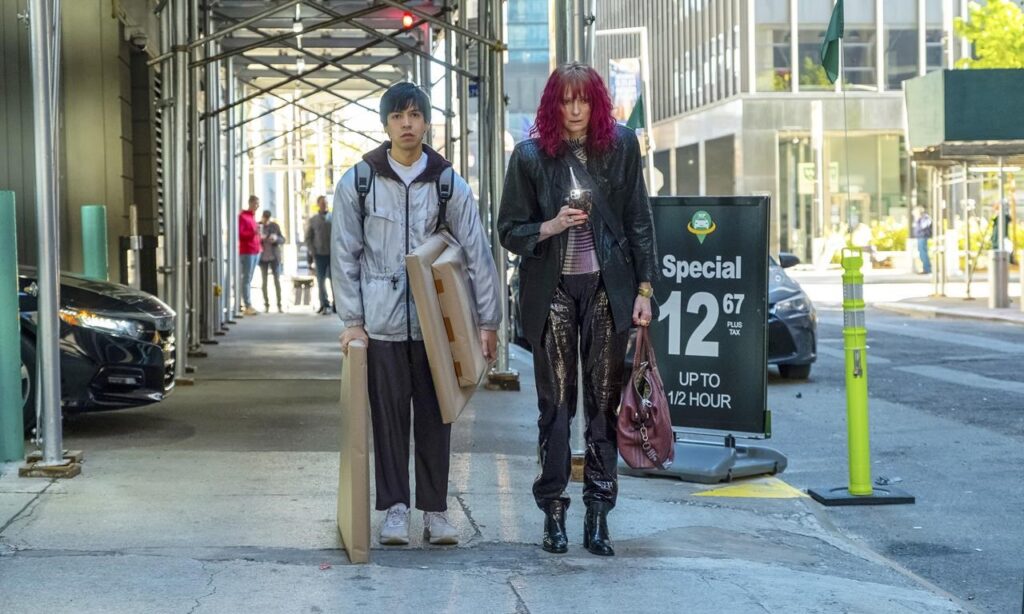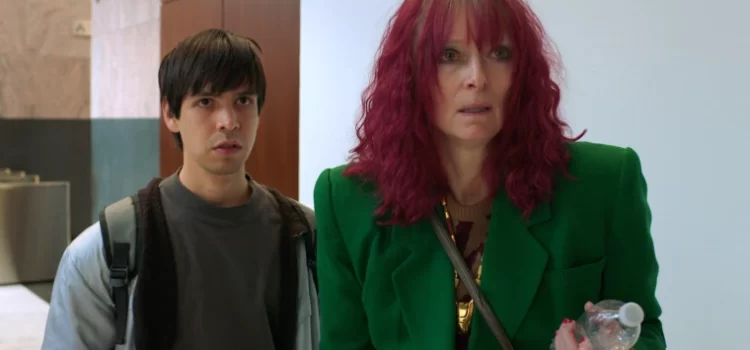By Alex McPherson
An ambitious vision bursting with magical-realist style and heart, director Julio Torres’ “Problemista” explores resonant themes of pursuing your dreams, finding unlikely friendship, and scrambling to get by in a hellscape of bureaucracy without betraying your true self.
Torres’ semi-autobiographical film, narrated by Isabella Rossellini, follows Alejandro (Torres), a sensitive soul from El Salvador, who is very close to his loving mother, Dolores (Catalina Saaverdra), who still lives there. Dolores, an architect, shielded Alejandro as a child from the outside world, creating for him an almost fairy-tale fortress in their backyard.
When Alejandro immigrates to New York City with hopes of becoming a toy designer at Hasbro, Dolores is supportive yet worried, frequently checking in and finding it difficult to continue her work.
Soft-spoken, sporting a prominent cowlick and an odd, childlike gait, grown-up Alejandro stubbornly, and admirably, refuses to give up on his “true calling” in the Big Apple. His ideas include twists on classic toys to teach kids what he deems as practical lessons (a slinky that doesn’t fall down the stairs, or Untrustworthy Barbie with fingers crossed behind her back). He remains frustratingly held back by the all-too-familiar “noreply” email rejections on his applications to Hasbro.

Struggling to pay rent and with the expiration of his work visa looming, Alejandro begins working at a cryogenic center called Freeze Corp, where people store themselves hoping to be revived many years later when there’s a cure for whatever is currently plaguing them.
Alejandro looks after the body of painter Bobby (RZA), husband of frazzled art critic outcast Elizabeth (Tilda Swinton). Bobby has made a career of painting unsellable portraits of eggs, weirdly enough, and has been diagnosed with terminal cancer, which he hopes can be cured in the future once he thaws and wakes up.
An accidental unplugging of Bobby’s “pod” leads to Alejandro being fired from the company and left without visa sponsorship, which spells his imminent deportation (visualized as an hourglass gradually running out of sand). Desperate to stay in America, Alejandro encounters the malcontent Elizabeth at Freeze Corp; she’s complaining about increases in pricing, and he soon after becomes her personal assistant.
Putting on a brave face and enduring Elizabeth’s hilariously erratic mood swings and endless tirades against contemporary society, Alejandro is tasked with curating a gallery show of Bobby’s egg paintings — the promise of visa sponsorship at the finish line.
Alejandro’s life in America depends on him getting the signature before time runs out, and jumping through all the baffling, dehumanizing hoops required to get there. He must also pretend to understand FileMaker Pro (“the Cadillac of spreadsheets,” according to Elizabeth), in order to satisfy her desire to catalog all of Bobby’s paintings and sell them to pay the fees at Freeze Corp.
With a satirical approach that oscillates between being laugh-out-loud funny, suspenseful, heartbreaking, and life-affirming, “Problemista” expertly explores the challenges of surviving as an outsider in a world seemingly designed to hold you back. Not every idea Torres presents lands equally effectively, but “Problemista” soars.

Much of the film’s success comes from its mastery of tone that never loses sight of what’s ultimately at stake for Alejandro. For all the humor that comes from Torres’ wry screenplay, empathetic characters, and heightened style, the threat of deportation looms, and the film never lets us forget that his livelihood hangs by a thread.
The film’s surrealist flourishes – like visualizing Craigslist as a physical entity (Larry Owens) floating in the ether wrapped in junk, work visa requirements as a never-ending series of escape rooms stacked on top of each other, people literally disappearing in Alejandro’s immigration office, and certain high-stake arguments as battles between an armored Alejandro and monsters in a cave (one of which is a showdown with a Bank of America employee about overdraft fees) – always serve to illustrate graver realities despite their out-there depiction.
While often heavy-handed, Torres’ approach is inventive and surprising from start to finish, choosing to remain grounded in immediate reality during particularly queasy moments. Combined with excellent production design, editing, memorable cameos from Greta Lee, Laith Nakli, and James Scully, plus a sprightly, chorus-infused score by Robert Ouyang Rusli, “Problemista” is simultaneously funny and disturbing as Alejandro navigates this colorful nightmare.
The film’s outward lightness is deceiving, belying an anger at America’s treatment of immigrants and outsiders struggling to find meaning in their lives who might not even get the chance to try in the first place. Still, “Problemista” maintains a sense of optimism and hopefulness that persists through the bleak circumstances.
The world can’t quash Alejandro’s, or Torres’, spirit, no matter how hard it tries. “Problemista” ultimately conveys a faith in humanity while condemning the archaic systems in which we operate.
Torres presents Alejandro as someone with big goals and quiet perseverance. His reticence to stand up for himself stems from both his innocence and knowledge that his privileges can all be lost in an instant if he steps out of line. Torres’ peculiar body language and dryly funny line delivery makes Alejandro instantly endearing, amusing, and sympathetic.
Alejandro’s timid resolve ultimately comes across as an act of resistance against the larger systems that try to kill his aspirations, as he both endures and learns from his temperamental boss.

Speaking of, Swinton absolutely crushes the role, bringing fiery, live-wire energy to her art critic outcast nicknamed “The Hydra.” Combative, entitled, passionate, and grieving her cryogenically-frozen husband, Elizabeth feels left behind by the modern world, struggling to navigate technology (any customer service representative should beware) and getting her way through sheer force of will.
“Problemista” treats Elizabeth empathetically, though, painting her as someone looking for meaning in her life and searching for peace, no matter how much chaos she causes along the way – very human in her contradictions, and a perfectly unhinged character for Swinton to play.
Her bond with Alejandro – running the gamut of emotions as she gradually sees him as a three-dimensional human being – is believable and rarely, if ever, overly sentimental. Torres’ screenplay skirts the edges of being twee without crossing the line – Alejandro and Elizabeth are lost souls finding kinship, and while their circumstances are vastly different on first glance, they share more in common than either of them thought possible.
Indeed, Swinton’s portrayal helps sell some of the film’s thornier takeaways: that of Elizabeth’s idea of finding success by creating “problems” and essentially harnessing your inner Karen. There’s something to be said for that, sure, but with some convenient, crowd-pleasing plot developments later on, it feels like Torres adding an easy platitude to a situation that’s far from black-and-white.
More poignant is the way Torres has repackaged his life experience into Alejandro’s story: creating his own art through past hardship and paying tribute to family and friends who helped him get to where he is today.
“Problemista,” then, remains an impressive achievement, especially for a first feature film. As an ode to outsiders, art, and friendship, there’s really nothing quite like it.

“Problemista” is a 2023 comedy-drama written and directed by Julio Torres and starring Tilda Swinton, RZA, James Scully, Greta Lee, Catalina Saaverdra, and Isabella Rossellini. It is rated R for some language and sexual content, and runtime is 1 hour, 44 minutes. It opened in theaters March 22. Alex’s Grade: B+.
Alex McPherson is an unabashed pop culture nerd and a member of the St. Louis Film Critics Association.

